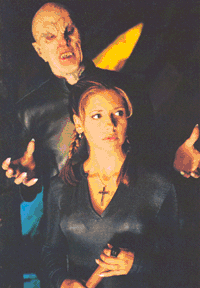  | ||||
HOME |
Buffy the Vampire Slayer: By Karen Linsley [Written in June 2003.] You have to watch Buffy the Vampire Slayer," my friends said. "It's wonderful." I eyed them suspiciously, wondering if they had been sniffing glue or something. How could a show with that title be even remotely good? I should have been. It took me three years to finally give it a chance. And I discovered that my friends were not hooked on sniffing glue; they were hooked on characters that were interesting and involving, a unique dialogue style, and some of the best writing ever to appear on television. Who knew? My non-glue-sniffing friends, apparently. Instead of the drivel I was expecting, I found a program that could turn from comedy to drama, from camp to brutal reality, and do so on a dime. In the universe of creator Joss Whedon, Buffy and her friends battle fantasy vampires and demons while facing the very real demons which confront all of us in our own lives. I found myself relating to every character in a very real way. (My ability to identify with the female superhero was assisted by her lack of a body stocking or dominatrix outfit.) No, most of us have never had to stake a vampire or decapitate some slimy beast from hell. But we've all endured the horror that is adolescence; the angst of unrequited love, the pain of not fitting in, the loneliness of being different, and the crisis we all reach as we try to define our identity. I just wish my own teen years had been seasoned with the often brilliant one-liners that brought a tremendous sense of fun to the show. Many episodes of Buffy were funnier than any sitcom on the air. Sometimes just the juxtaposition of the real and the bizarre had me howling with laughter. Whedon was not afraid to allow the characters to evolve, change and, well, actually grow up. They didn't remain in high school for seven years. And while growing up, these people we had come to love had to face the more serious challenges of adulthood. In later seasons, the series tackled more mature plot lines involving sexual orientation, self-destructive relationships, addiction, and death of a loved one. And Buffy had to come to terms with the horrible burden of responsibility and ultimate loneliness of being the "one girl in all the world" chosen to fight supernatural evil. The life of a Slayer is demanding and short. As these later seasons progressed, the show became much darker, starting in the last quarter of the fifth season when, in a sudden and shocking scene, Buffy found her mother dead in the living room. And it wasn't from a vampire bite. It wasn't something she could fight. Buffy was as helpless as we all are in the face of death by natural causes, and this tragedy played out with agonizing intensity. In the spectacular fifth-season finale, "The Gift," Buffy sacrificed her life to save her sister and the world. But the Slayer would not be allowed to rest in peace. Fearing that the supernatural circumstances of Buffy's death might have sent her soul into a horrible dimension, her well-intentioned friends laid down a little pavement on the road to hell. They brought Buffy back to life via witchcraft. Problem was, she had gone to heaven instead. The ramifications of this act began the darkest and most emotionally challenging arc attempted in this series. Buffy had to deal with the trauma of having her life back and not wanting it. Compared to heaven, this world seemed like hell. This experience isolated Buffy from many of the other characters and increased her sense of loneliness. And while this storyline led to the fan-favourite musical episode "Once More, With Feeling," many people found the sixth season too bleak and depressing. Some turned off their TVs. Me, I turned off my heart. It was getting a little broken. As I approached the seventh and final season, I braced myself for a finale I was sure would be devastating. Given the recent infatuation with tragedy, I was convinced that Buffy would end up dead, permanently. Well, there was certainly tragedy. Several characters did not make it to the last roll of the credits. But Buffy and the original core group of Willow, Xander and Giles survived that final battle. And magic had allowed every girl with potential in the Slayer line to claim her power immediately. The loneliness and responsibility of being the only Slayer were over. Buffy's hopeful smile in the final frame spoke volumes. She had a future. She could dream of a normal life. And of course, if she really misses having a daily dose of carnage, there's always that Hellmouth in Cleveland. Other articles by Karen Linsley on this site: Other material with Buffy the Vampire Slayer content on this site: | |||
Interviews, Speeches, Articles | Voyageur Home Upcoming Events & Conventions | Club History Main Site Editor & Site Problems IDIC Home Copyright © 2003, Karen Linsley. All rights reserved. | ||||
 Besides, hadn't I heard that the movie truly stank? And weren't most programs dealing with teenagers of the "Hey, dude, I got into my parents' liquor cabinet last night and got so drunk I puked on my shoes" variety? No, I wasn't interested.
Besides, hadn't I heard that the movie truly stank? And weren't most programs dealing with teenagers of the "Hey, dude, I got into my parents' liquor cabinet last night and got so drunk I puked on my shoes" variety? No, I wasn't interested.